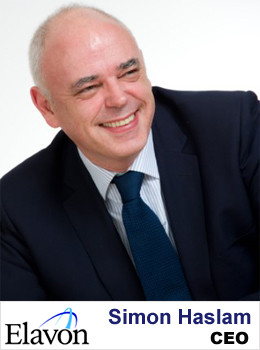
Elavon’s CEO Simon Haslam learned the importance of teamwork at an early age. The British-born Haslam started playing rugby at age 12 and eventually became the Captain of his school team. “Rugby is like American football, but without the pads and helmets,” he says. “There’s a crucial role for everyone in rugby, and it definitely taught me the significance of team building.” The leader of one of the world’s leading payments solutions provider definitely believes that teamwork and mutual respect are critical components to the success of any business.
Haslam was born in Paddington, located in an inner borough of central London known as Westminster – home to Parliament, 10 Downing Street, St. James Palace and Paddington Bear – the last being the only one that he usually mentions. His favorite subjects in school were history, geography and economics. Haslam started his career in the management training program of Midlands Bank, now part of HSBC. Beginning as a teller, he was also trained in various bank roles including the negotiation of operational credits. Haslam soon figured out that he enjoyed risk management best. “My first major role was looking at bank branches and reviewing how they made risk decisions,” he says.
As he moved up the ranks of the bank, Haslam worked as a private banker, in corporate lending, start-ups and as a traditional branch manager - at age 26, where he had his own P&L. “I learned a lot about leadership at this time – what to do and what not to do,” he says. “It’s important to speak to people as you would like to be spoken to and also to make good use of calmness and self-control.” He abhors arrogance of any kind or any other type of overbearing management traits.
In 1995, Haslam left HSBC for Citigroup where he ran credit and credit operations for their newly formed retail operation in the UK. In 2000, Citi decided to set up a merchant acquiring business and his boss asked him to figure out how risk worked in that business. “We had a Diner’s Club business in Germany, but other than that we were basically starting from scratch,” he says. The business grew for 5 years and was then sold to an acquirer based in Atlanta called Nova Information Systems, which is now Elavon.
After running the credit and risk team for Europe, Haslam was asked to run the European business and then moved on to run all of Elavon’s global business just after they moved into Mexico and Brazil. “One of the things I learned at Citi was the importance of respecting diversity and working effectively with different cultures,” he says. “If you try to do everything in an English or American way, you’ll most likely fail.”
Haslam became CEO of Elavon in May of 2013 and says their strategy is to deepen their footprint in the markets that they are already in as well as moving into new markets including Asia. “To be truly global, we have to be in Asia,” he says. With customers like Delta Airlines, American Airlines and Air France, Elavon is the largest merchant acquirer for air travel in the world. They are also very strong in hospitality and healthcare. The company is the second largest acquirer in the world by number of customers and the fifth largest by volume. They currently process approximately $450 billion in transactions per year.
Known for their many successful partnerships with other financial institutions, Haslam expects their growth to continue to be partner-based and that they will remain focused on key verticals like travel, hospitality and healthcare.
Asked about new entrants to the payment processing ecosystem such as Square, he said “…love them or loath them, they have changed the way that business looks at payments. To that extent, they’ve been a good disruption. Whatever else happens in the future, there will still be an account linked to a technology or service of some sort to facilitate payment into another account.”
By far the biggest issue in payments in the U.S. is the need for more security measures to protect businesses and customers, such as the recent EMV, or “chip card” conversion. EMV, which stands for EuroPay, MasterCard and Visa, is chip technology embedded into a payment card that integrates with credit card terminals to enhance fraud protection at the point of sale. “Not only does this help make customers more secure,” he says, “but it also makes PCI compliance a lot easier for the merchants. 85% of merchants are small businesses for whom this conversion will be the first major upgrade in years to help make them more secure.”
Elavon is a leading provider of EMV-enabled terminals and software as well as provides other industry-leading security offerings such as tokenization and encryption. “EMV is certainly leading to path to more security options in the U.S., but it’s only one piece of the puzzle. We always recommend a layered approach to security for our customers to have the greatest protection.”
NEXT NEWS